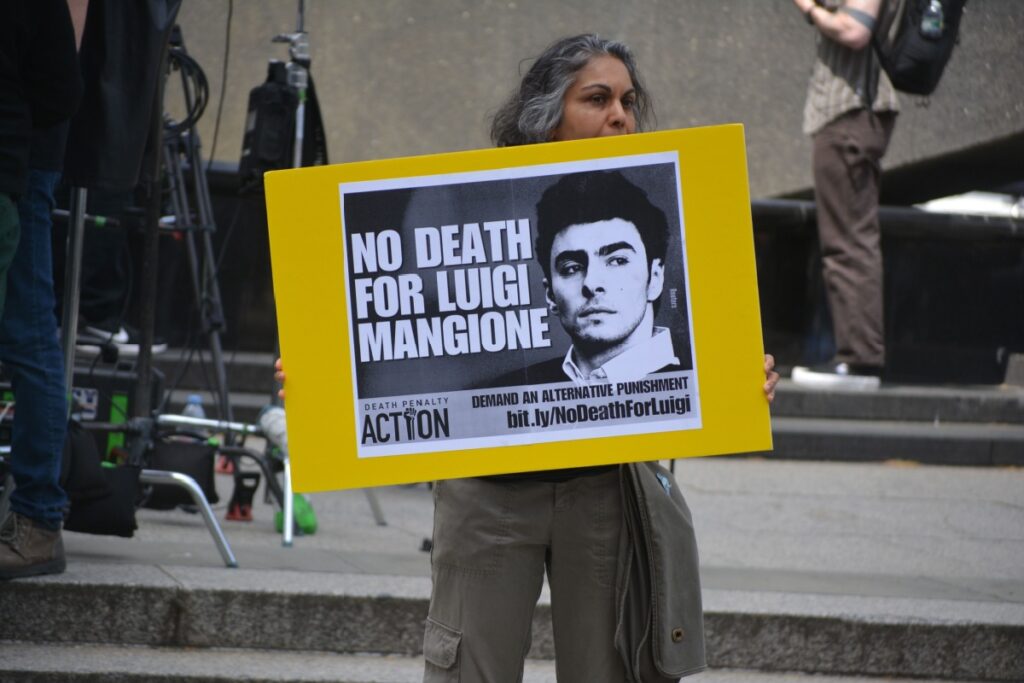On December 4, 2024, Brian Thompson, the CEO of UnitedHealthcare, was shot and killed outside the New York Hilton Midtown hotel in Manhattan.Authorities say the killing was captured on surveillance footage and that the bullets’ casings bore the words “delay,” “deny,” and “depose”—phrases reminiscent of insurance-industry tactics.In early December, law enforcement arrested Luigi Nicholas Mangione, a 27-year-old man from Maryland, on federal charges in connection with the killing.
Mangione has pleaded not guilty to federal murder charges, and prosecutors have signaled their intent to seek the death penalty in the case. In the state courtroom, a judge recently dismissed terrorism charges against him in New York while preserving a second-degree murder charge.
During pretrial proceedings, Mangione’s lawyers have challenged what they say is prejudicial public commentary by government officials. They contend remarks by White House and Justice Department figures have compromised his right to a fair trial and tainted the public narrative around his guilt.
Judge’s Rebuke of DOJ Statements
On September 24, 2025, U.S. District Judge Margaret M. Garnett, overseeing the federal case, issued a sharp order warning that public comments by DOJ officials likely violated a local court rule restricting remarks about a defendant’s guilt before trial. Among the criticized actions were DOJ reposts of remarks made by former President Donald Trump calling Mangione a “pure assassin,” and other statements that appeared to prejudge the case.
Judge Garnett directed the Justice Department to ensure its officials cease further prejudicial commentary and to submit a sworn explanation by October 3 detailing steps to prevent recurrence. She also warned that future violations could trigger sanctions or contempt charges.
The judge’s ruling underscores the tension between prosecutorial advocacy and the judiciary’s imperative to protect due process, particularly in a high-visibility case with a possible capital sentence.
Defense Strategy: Removing Death Penalty
Parallel to the judge’s ruling, Mangione’s legal team has filed a detailed motion urging the court to bar federal prosecutors from pursuing the death penalty in the case. The attorneys argue that extensive and inflammatory public statements by the Attorney General Pam Bondi, White House officials, and DOJ spokespeople have prejudiced jurors and damaged Mangione’s ability to receive impartial adjudication.
They contend that the government has treated the arrest and subsequent coverage like a political spectacle or propaganda, rather than a restrained legal proceeding. The defense asserts the death penalty would be an excessive measure under these circumstances and that the case should instead proceed on lesser charges.
Prosecutors, for their part, maintain that the killing was premeditated, that Mangione’s actions were ideologically motivated, and that federal law allows for capital punishment in certain homicides involving firearms and interstate conduct.
Broader Legal and Case Developments
Investigators report that a gun recovered from Mangione was matched to shell casings found at the scene of Thompson’s killing. Additionally, prosecutors say Mangione had previously written about rebelling against the “greed-fueled health insurance cartel” and that in social media posts he described the act of killing Thompson as conveying that a “greedy bastard … had it coming.”
In arguing against the state terrorism charge, a New York state judge ruled that Mangione’s actions did not legally meet the definition of terrorism under state law, even while keeping the murder charge intact. That decision means his fate will hinge on standard criminal proceedings in both state and federal courts.
Authorities also allege that Mangione’s killing has inspired others to view violence as a means of protest, citing recent high-profile shootings as evidence of contagion. The case has stirred attention not only for its dramatic elements but for the broader questions it raises about prosecutorial restraint, public commentary by government officials, and the safeguarding of a defendant’s rights in politically charged litigation.


